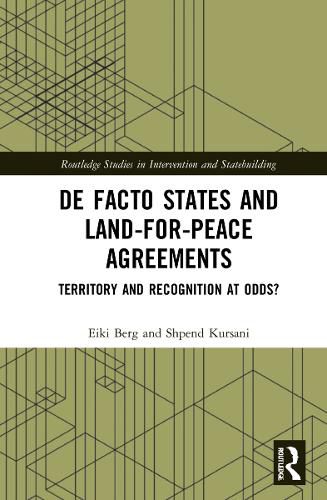Readings Newsletter
Become a Readings Member to make your shopping experience even easier.
Sign in or sign up for free!
You’re not far away from qualifying for FREE standard shipping within Australia
You’ve qualified for FREE standard shipping within Australia
The cart is loading…






This book presents an analytical framework which assesses how ‘land-for-peace’ agreements can be achieved in the context of territorial conflicts between de facto states and their respective parent states.
The volume examines geographic solutions to resolving ongoing conflicts that stand between the principle of self-determination (prompted by de facto states) and the principle of territorial integrity (prompted by parent states). The authors investigate the conditions under which territorial adjustments can bring about a possibility for peace between de facto states and their parent states. It does so by interrogating the possibility of land-for-peace agreements in four de facto state-parent state pairs, namely Kosovo-Serbia, Nagorno-Karabakh-Azerbaijan, Northern Cyprus-Republic of Cyprus, and Abkhazia-Georgia. The book suggests that the value that parties put on land to be exchanged and peace to be achieved stand at odds for land-for-peace agreements to materialise. The book brings theoretical and empirical insights that open several avenues for discussions on the conservative stance that the international community has held on territorial changes in the post-1945 international order.
This book will be of much interest to students of statebuilding, state formation, secessionism, political geography, and international relations.
$9.00 standard shipping within Australia
FREE standard shipping within Australia for orders over $100.00
Express & International shipping calculated at checkout
This book presents an analytical framework which assesses how ‘land-for-peace’ agreements can be achieved in the context of territorial conflicts between de facto states and their respective parent states.
The volume examines geographic solutions to resolving ongoing conflicts that stand between the principle of self-determination (prompted by de facto states) and the principle of territorial integrity (prompted by parent states). The authors investigate the conditions under which territorial adjustments can bring about a possibility for peace between de facto states and their parent states. It does so by interrogating the possibility of land-for-peace agreements in four de facto state-parent state pairs, namely Kosovo-Serbia, Nagorno-Karabakh-Azerbaijan, Northern Cyprus-Republic of Cyprus, and Abkhazia-Georgia. The book suggests that the value that parties put on land to be exchanged and peace to be achieved stand at odds for land-for-peace agreements to materialise. The book brings theoretical and empirical insights that open several avenues for discussions on the conservative stance that the international community has held on territorial changes in the post-1945 international order.
This book will be of much interest to students of statebuilding, state formation, secessionism, political geography, and international relations.